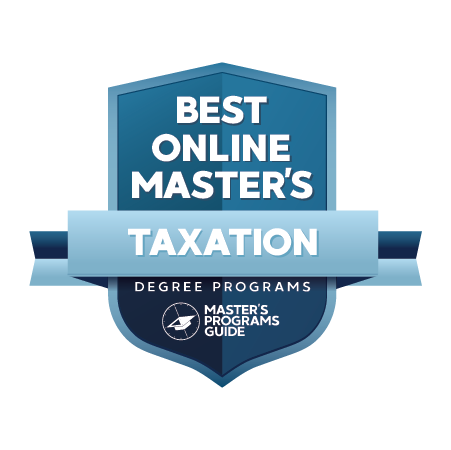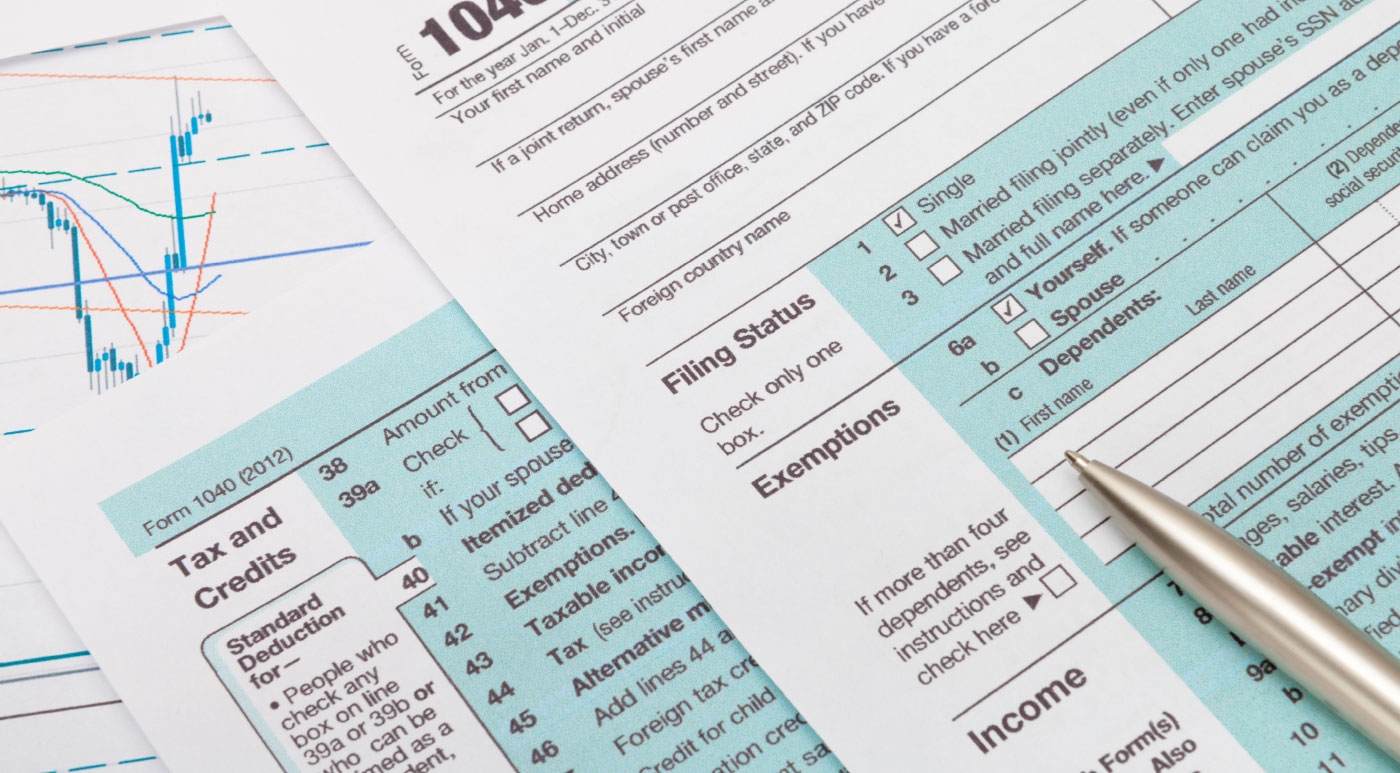Ready to find your ideal master's program?
www.mastersprogramsguide.com is an advertising-supported site. Featured or trusted partner programs and all school search, finder, or match results are for schools that compensate us. This compensation does not influence our school rankings, resource guides, or other editorially-independent information published on this site.
Individuals, nonprofits, and corporations alike have to deal with their taxes each April. Navigating through the various deductions, credits, and specialized forms can seem daunting without assistance. According to the Internal Revenue Service, there were 150.3 million individual tax returns with $10.4 trillion of income filed in 2016. The IRS handled 5.9 million corporate tax returns worth $88 trillion in 2013. Accountants and financial planners with intimate knowledge of tax policies are invaluable for filers who want to maximize benefits without landing in lengthy audits.
The complexity of domestic and international tax systems makes a tax expert necessary for any filer. The National Center for Charitable Statistics counted 1.5 million nonprofits in the United States in 2018, all of which need to comply with strict standards for financial reporting. Companies big and small have to contend with varying city and state tax policies that can be thorny. Seven states do not feature taxes, but taxpayers might not take into account sales taxes that are levied at the local or state level. In the other 43 states, credits and deductions mean effective rates ranging from 2% to 13%. International treaties with 67 countries as of 2019 feature unique policies that add complications to the financial reporting process. Business owners know that complications mean added time, manpower, and expenses that can offset a year of hard work. A Master’s of Taxation helps a financial professional take advantage of the shifting sands of tax policy. Legislators are constantly tinkering with tax policies that can surprise families and businesses when tax season comes around. Subtle changes to policies like capital gains taxes and child credits can cost or save a filer’s money. Adding new forms and sections to a tax return can add stress to a tough situation. This is where tax experts step in and save the day. Master’s programs in taxation dig deep into tax topics with specialized training on everything from estate taxes to tax planning. The best master’s programs in taxation offer practical experiences in public or private settings that bring these lessons to life. For example, Villanova University offers internships with the IRS Office of the Chief Counsel and an in-house federal tax clinic to train tax professionals. An online master’s program like the ten programs on our list caters to working professionals looking to supercharge their careers. These programs feature online lectures and assignments that can be completed around work schedules. Faculty and staff in graduate taxation programs are experts in the field with practical experience invaluable to aspiring professionals. Completing a master’s in taxation also opens a professional to concepts integral to professional certification. Certified public accountants are licensed tax professionals who often hold advanced degrees in business, finance, or taxation. The American Institute of CPAs, which oversees the CPA Exam, reported a 53.3% pass rate on its tests through the first half of 2019. While being a CPA is not mandatory for specializing in taxes, a Master’s in Taxation overlaps with the various topics included in the four-part CPA Exam.
COMMON APPLICATION AND ADMISSION QUESTIONS
If you are up to the tax challenge, a good starting point is learning more about application and admissions requirements for a good master’s program. Taxation degrees are often nestled within university business or law schools depending on the degree’s emphasis. Applicants interested in taxation from the business perspective can opt for the former, while those interested in tax law can steer toward the latter. A Master’s of Taxation will appear on a graduate’s resume no matter the school, but a business or law emphasis could matter to prospective employers. The top master’s programs listed in this article share similarities in their application process. Most programs do not require completion of the Graduate Management Admissions Test or the Graduate Record Examinations with professional certification. CPAs and lawyers can fulfill these requirements using their licenses. For applicants without a JD or CPA, GRE or GMAT scores that meet the school’s standards may be required. There are exceptions like the University of Cincinnati, which relies solely on other application materials to determine student readiness. Graduate programs ask for basic biographical information on their applications. An applicant is asked their contact information along with educational and professional experiences. A resume is a standard requirement for taxation programs that proves a consistent or growing interest in the field. Aspiring taxation students should make sure their applications and resumes are aligned to avoid inconsistencies. The application fees for the ten best programs in the field range from free for St. John’s University to $100 for Northeastern University. Graduate admissions teams are interested in undergraduate and graduate GPAs as measurements of academic prowess. Every applicant should reach out to past programs for official transcripts that confirm their GPAs. Transcripts showing strong performances in business and finance courses indicate a student’s desire to advance in the field. Graduates of other master’s programs in business or law are often strong candidates for taxation degrees due to their past work. So far, the application might sound like a formal process that doesn’t allow an applicant to show their interests. Graduate schools encourage applicants to express themselves through personal essays or goal statements. A personal essay should answer why the applicant wants to pursue a degree in taxation. The best essays demonstrate drive, passion, and interest in more knowledge in the field. Schools that ask for goal statements want to know how their program advances an applicant’s career aspirations. Applicants who write eloquent versions of why tax professions are their dream jobs improve their odds. Another way for applicants to tell their stories is by seeking mentors, instructors, and employers as their recommendation writers. Programs typically require two to three letters of recommendation supporting a candidate’s application. A prospective student can tell their personal and professional story by selecting letter writers who have seen their development. Strong letters of recommendation can sway admissions officials because they provide perspectives on a student’s intellectual journey. If all of the application pieces fall into place, an applicant can think ahead to how they will finance their education.
WHAT ABOUT FINANCIAL AID & SCHOLARSHIPS?
The National Center for Education Statistics calculated an average tuition of $11,617 for graduate programs at public universities in 2016-2017. The NCES also found that tuition for graduate degrees at private universities averaged $24,712 per year. In short, a master’s degree is an expensive investment without proper planning. Taxation students can show their financial planning skills by searching for additional methods of paying tuition. Universities listed in our ranking of the best master’s programs in taxation share similar methods for funding graduate degrees. Graduate students can defer the expenses of their education with federal or personal loans. Exceptional candidates can pursue sponsored scholarships through their taxation programs. These scholarships are funded by alumni who want to advance scholarship in the field. Law and business schools often operate scholars programs that automatically consider applicants for funding. A scholars program might require student participation in research projects and consultations with local businesses. Taxation programs can also arrange paid internships that provide financial incentives to assist participating companies. Taxation students should consider scholarships from professional groups specializing in accounting. The AICPA sponsors scholarships for students interested in becoming CPAs. The John L. Carey Scholarship Award offers $5,000 per year to a graduate student who earned a non-business bachelor’s degree but wants to become an accountant. The AWSCPA Scholarship Award can support a female graduate student interested in taxation with a $5,000 reward. Minority students who pursue graduate degrees in accounting or taxation can apply for up to $5,000 per year through the AICPA Scholarship Award for Minority Accounting Students. Professionals in search of master’s degree funding should also look to professional groups at the state level. There are state-level versions of the AICPA that maintain scholarships for students at local universities. The Illinois CPA Society’s funding options are good examples of how state professional groups are helpful to students. Students at Illinois universities can apply for the Accounting Scholarship Program to receive up to $4,000 per year. This program includes four scholarships that are considered under one application. Successful applicants require GPAs of at least 3.0, graduate status for the next academic year, and promise to take the CPA exam within three years of receipt. The Illinois CPA Society also provides a reimbursement reward for the CPA Exam and an internship program for undergraduate students. Applicants for scholarships and grants can improve their odds of funding with top-notch application materials. A lot of funding options are designed for graduate students who can show financial limitations that would limit their studies without assistance. Scholarship applicants should learn more about the sponsoring organizations or individuals to craft essays or application materials. Given the number of applicants for each funding source, it is important to supply error-free and complete documentation as requested by the scholarship provider. It is also important for applicants to pursue multiple funding sources to avoid tuition distractions during their studies. All of this work can help a future business leader complete their degrees and open doors to new career paths.
HOW MUCH CAN I MAKE WITH A MASTER’S IN TAXATION?
Taxation students are keeping their eyes on future career options as they complete their courses and practical experiences. The most obvious route for a taxation graduate is a career as an accountant or auditor. In these career paths, taxation degrees help practitioners stay nimble in the face of tax changes and employer or client policies. The Bureau of Labor Statistics found a median salary of $70,500 in 2018 for this career path. With a median salary of $38,640 for all occupations, tax experts realize solid financial outcomes for their work. Accounting and auditing jobs are projected to grow by 6% between 2018 and 2028, slightly outpacing the 5% growth projection for all occupations. The BLS statistics on accountants and auditors, however, focuses on professionals with bachelor’s degrees. PayScale’s review of accountants with Master of Taxation degrees indicates an average salary of $82,000. The salary research site lists a number of positions above this average rate that are intriguing for MTax degree holders. Tax managers who supervise accounting and financial teams within corporations earn average salaries of $96,807 with top earners receiving $127,000 per year. Tax directors received salaries ranging from $105,000 to $198,000 in 2019 in recognition of the complexities of overseeing corporate tax processes. The Master of Taxation, along with stellar professional experiences, open these careers to degree holders. Master of Taxation graduates could use their degrees to venture into financial management positions. The BLS notes that financial managers help companies develop fiscal goals that inform investments, tax filings, and new initiatives. Financial management careers typically require five years or more of professional experience along with business degrees. Taxation experts prove to be appealing candidates for these positions, however, because they understand the tax implications of corporate decisions. Graduates who want to break into financial management careers can start as financial analysts. Analysts earned $85,660 per year on average in 2018. The BLS found a median salary of $127,990 for financial managers in 2018 with a projected job growth rate of 16%. Ambitious professionals who understand the intricacies of taxes and finance should always consider executive suites as long-term goals. The BLS and PayScale confirm what many of us know already: executives make lucrative salaries. The top executives classification from the BLS features a median salary of $104,980 and a projected growth rate of 6%. Chief financial officers earned average salaries of $131,644 in 2019 with a range of $73,000 to $219,000 depending on bonuses and incentives. Accounting firm partners receive $150,739 on average with top earners receiving $357,000 for their work. There are a lot of variables awaiting professionals who specialize in taxation. Students specialize in particular topics based on their course selections, concentrations, and practical experiences. High-demand fields in business and finance can shift over time depending on public policy and global economic trends. Graduates who enter one area of the business world might want to shift to another in short order to live in new places or test their skills. Completing an online master’s program in taxation provides the flexibility and skills necessary to achieve goals set one year or one decade from now.
OUR RANKING CRITERIA
We have a time-tested four-part formula designed for ranking the best colleges in the nation that we’d love to share with you. We prioritize four major factors: Earnings Potential, Affordability, Student Satisfaction, and Selectivity. Reliable research and well-harvested data are the main ingredients in our recipe for success. We don’t make recommendations based on personal opinions, or financial incentives. Our revenue and content are completely separate, and sponsored schools have no impact on our rankings. The only way to make it onto one of our lists is to have an incredible academic program! If you want to know more we encourage you to check out our methodology page.
Check out our ranking of the 10 Best Online Master’s Programs in Taxation!
#1. VILLANOVA UNIVERSITY
MASTER OF TAXATION
Villanova University has been a national name in recent years due to back-to-back national championships by the Wildcats men’s basketball team. Outside the lines, this Philadelphia-based university is a national leader in academic programs. Villanova University conferred degrees on its first class in 1847 when the school was focused on training future priests. Since its founding, Villanova has become a center for academic research thanks to facilities like the Innovation, Creativity, and Entrepreneurship Institute. U.S. News & World Report confirms the school’s modern reputation with a No. 46 rank in National Universities and a No. 54 place in Best Value Schools. The online Master of Taxation continues Villanova’s tradition of higher education excellence. To gain admission to this Master of Taxation program, applicants need to submit their resumes, personal statements, applications, and letters of recommendation. The application fee was $50 for the 2019-2020 school year. Villanova University requires applicants to be certified public accountants or have completed the CPA, GRE, or GMAT exams in the previous five years. Prospective students can apply for the university’s fall, spring, and summer semesters. The Charles Widger School of Law offers degree-specific scholarships for MT students. Taxation students start their degree paths with six required courses. These courses include three tax overview courses and explorations of professional practice, corporate taxes, and partnerships. Electives challenge tax professionals to understand the complexities of global tax planning, tax-free reorganizations, and charitable gift planning. Villanova University features a Federal Tax Clinic that relies on graduate interns to assist clients. Another internship opportunity with the Internal Revenue Service’s Office of the Chief Counsel shows the legal mechanisms behind federal tax enforcement. Every MT student needs to complete at least 30 graduate credits prior to graduation. The Master of Taxation from Villanova University can be completed in two years of completely-online courses. The Widger School of Law encourages MT students to augment their studies with certificates. The Employee Benefits Certificate uses courses in pensions and executive compensation to support professionals who focus on benefits management. MT students interested in the complexities of state and federal estate laws can add the Estate Planning Certificate. The State and Local Taxation Certificate digs deeper into topics like sales taxes and business transactions. Combining the MT with a certificate can help graduates demonstrate their specialty to prospective employers and clients. The U.S. Department of Education’s College Scorecard provides a look at Villanova University’s student demographics. In 2019, the student body was 74% white, 8% Hispanic, 6% Asian, and 5% African American. Ninety-five percent of students completed their degrees on full-time tracks. The department found 42% of students received federal loans to cover their tuition. Within three years of graduation, 90% of Villanova alumni began making payments on their student loan principal. In 2019, the Widger School of Law reported that its students were 55.4% female with an average age of 24. The school noted that 50 majors and 108 undergraduate schools were represented in its cohort. A minority of Widger program participants arrive directly from undergraduate programs, showing the varying paths that lead to the MT degree.
#2. UNIVERSITY OF AKRON
MASTER OF TAXATION
The University of Akron’s mascot is Zippy the Kangaroo, first selected by the school in 1953. Zippy’s name comes from the Akron Zips nickname, a shortened version of the Zippers brand made by local company BF Goodrich. The university’s connection to local businesses has strengthened its business and finance programs. U.S. News & World Report ranked the university No. 260 in Business Programs for 2019-2020. The Association to Advance Collegiate Schools of Business has bestowed the University of Akron with a rare dual accreditation for accounting and business programs. The College of Business Administration offers an assortment of programs like the Master of Business Administration, the Master of Management, and the Master of Taxation. The Master of Taxation, in particular, shows the innovative methods used by the University of Akron. Undergraduates interested in tax careers can pursue Akron’s BS/MTax accelerated program. Certified public accountants and attorneys do not need to complete the GMAT before applying to the MTax program. Students who don’t hold those qualifications need GMAT scores of at least 500 or meet current standards for the GRE, LSAT, or MCAT. The program application also requires at least two letters of recommendation, a statement of interest, and a current resume. The University of Akron requires a $45 application fee from American applicants and a $70 fee from international applicants. The MTax program can be completed in 15 months through online courses or 21 months via in-person classes. Graduate students build knowledge through courses in financial accounting and federal taxation. The 24-credit core of this program includes lessons in international taxation, tax research, and taxation of partnerships. The College of Business Administration also requires the completion of two electives on topics like tax crimes and estate planning. MTax students join others in the College of Business Administration in gaining practical experiences through internships and research. Each MTax student works with a faculty advisor to arrange an internship or co-op to build real-world experiences. The University of Akron notes that most graduate internships and co-ops are paid, allowing students to cover expenses while completing tasks. On-campus centers like the Institute for Leadership Development and the Fitzgerald Institute for Entrepreneurial Studies also offer opportunities for student participation. The Goodyear Executive Leadership Forum and the Business Analytics Innovation Summit are examples of university events that attract international finance leaders. The University of Akron serves students through its main campus, four satellite centers in the region, and its online learning platform. The student body in 2018 featured 53.4% male students and 46.6% female students. Thirty-five percent of students received federal grants intended for low-income students. The average age of graduate students at the University of Akron was 26 due to programs geared toward returning students. Akron Zips athletics programs have been successful on a national scale including three national championship appearances by the men’s soccer team from 2009 to 2018. Students near the Akron campus partake in clubs and organizations like the 2380 Film Club, the Trap Shooting Team, and the Painting and Drawing League.
#3. DEPAUL UNIVERSITY
MASTER OF SCIENCE IN TAXATION
DePaul University holds the distinction as the nation’s largest Catholic University based on enrollment. DePaul first surpassed fellow Catholic university St. John’s University in 1998 and held this lead through 2019. This private school draws students to two Chicago campuses with strong academic programs along with a rich history. U.S. News & World Report ranked DePaul University No. 125 in National Universities and No. 56 in Best Undergraduate Teaching for 2019-2020. Since 1907, DePaul University has opened its doors to promising applicants of all religious faiths and backgrounds. Business students completing traditional and online programs leverage DePaul’s connections to corporations based in Chicago. The Master of Science in Taxation is an example of how these connections produce highly skilled graduates. Applicants to this taxation degree do not need to complete the GMAT or GRE. The online application form includes a required essay of interest in the field. Prospective students also need to submit their resumes. DePaul University does not require letters of recommendation for the MS in Taxation. The application fee is $60, and students can seek admission for four intake periods each year. The MS in Taxation is a 46-credit degree that can be completed in one year of full-time study. The Kellstadt Graduate School of Business also encourages professionals to complete their MS in up to three years of part-time study. Taxation students prepare for their post-graduate careers with eight required courses, like Tax Research and Current Problems in Taxation. One required course in international tax helps students understand the global implications of tax policies. Elective options like Partnerships, Deferred Compensations, and Consolidated Returns allow customization based on student interests. Graduate students don’t have to venture far to find funding sources for their MS degrees. The Kellstadt Graduate Scholarship provides full funding for three-quarters of courses for promising domestic students. International students can pursue the Kellstadt Dean’s Scholarship for three-quarters of tuition funding. Alumni of other DePaul University programs automatically qualify for The Double Demon Scholarship, which provides a 25% discount on tuition. In 2018, the graduate school provided $3 million in scholarship awards to master’s students in business disciplines. The Kellstadt Graduate School of Business notes that 96% of 2016 MS in Taxation graduates worked full-time six months following graduation. During enrollment, DePaul University chapters of the Institute of Internal Auditors, the Graduate Students for Accounting, and other groups encourage networking among MS candidates. Taxation students can count on Ledger & Quill, an accounting alumni organization, to guide their post-graduate paths. DePaul graduates can later pursue traditional versions of the MBA and Doctor of Business Administration. The university’s student body mirrors the diversity of the Chicago metro area. The Enrollment Management and Marketing Office indicated that 35% of graduate students were Latino, African American, Asian, or multiracial. DePaul attracted 871 graduate school students in 2018 spanning 70 countries, including China and India. DePaul University found that 17% of graduate students in 2018 completed their undergraduate degrees at the school. The Kellstadt Graduate School of Business featured 66% full-time students and 34% part-time students, underlining the school’s flexible programs.
#4. UNIVERSITY OF CINCINNATI
MASTER OF SCIENCE IN TAXATION
The University of Cincinnati’s athletics programs have produced generations of professional athletes. Former Bearcats who plied their trades in the major leagues include Hall of Fame pitcher Sandy Koufax and former NBA star Oscar Robertson. In the 21st century, the Bearcats dance team has shown the university’s athletic prowess with four national championships between 2004 and 2009. Since 1893, the university has also drawn students to Cincinnati’s north side with exceptional learning opportunities. Niche’s 2020 grades for American colleges placed the school No. 48 in Top Public Universities in America. The online Master of Science in Taxation supports that ranking with a flexible but rigorous curriculum. Applicants to the MS in Taxation do not need to submit GMAT or GRE scores to gain admission. The program’s application requires a $65 application fee for domestic students and a $70 fee for international students. Prospective students submit at least two letters of recommendation and current resumes with their online packet. The University of Cincinnati requires completion of a 500-word goal statement that explains how the MS in Taxation program is important to an applicant’s career. An application should also include unofficial undergraduate and graduate transcripts to verify degree completion. Every MS in Taxation student completes 30 credits including 16 required credits and 14 elective credits. These courses examine a broad spectrum of topics like corporate tax structure, IRS tax practice, and international taxation. Students demonstrate their expertise in tax research and policy by completing capstone projects prior to graduation. The University of Cincinnati encourages students to contact faculty from the application process through initial enrollment to improve learning experiences. Students do not need to sit down at specific times to complete their work with recorded lectures available around the clock. Tuition policy for the MS in Taxation and other online programs varies based on student status. Full-time students pay flat rates for each semester, while part-time students pay per-credit rates. The University of Cincinnati listed an in-state tuition of $11,961 and an out-of-state tuition of $14,380 for full-time study in 2019. Part-time students not based in Ohio paid $1,035 per credit for taxation courses with a $1,020 per-credit rate for Ohio residents. The university’s Cincinnati Tuition Guarantee creates consistency in educational costs with a five-year rate freeze on a student’s tuition and fees after admission. Graduate students who commit to teaching careers after completing their programs can receive up to $8,000 through the TEACH Grant Program. The Office of Equity & Inclusion found an ambitious and diverse student body when conducting research in 2016. Among first-year students, 21% were first-generation students, and 28.2% were eligible for federal grants for low-income families. The undergraduate class featured 55 finalists for National Merit and National Achievement Scholarships. Demographic statistics for the Fall 2016 intake included an average age of 24.3 for all programs and a majority female student body. Twenty-one percent of domestic students came from outside of Ohio, and international students represented 7.6% of the Fall 2016 student body.
#5. CALIFORNIA STATE UNIVERSITY, NORTHRIDGE
MASTER OF SCIENCE IN TAXATION
In the heart of California’s San Fernando Valley, California State University, Northridge provides affordable online and traditional programs. The school’s distance learning options include two bachelor’s degrees, ten master’s degrees, and four certificates. Online students can also select personal or professional enrichment courses through Open University. California State University, Northridge has evolved quickly since opening its doors in 1958. U.S. News & World Report places Northridge among the region’s leading schools with a No. 20 in Top Public Schools and a No. 49 in Regional Universities West. The Master of Science in Taxation is a good example of the online programs offered by California State University, Northridge. The Tseng College bypasses the GMAT requirement for MS in Taxation applicants if they show undergraduate GPAs of at least 3.0. Current CPAs or professionals with at least four years of relevant experience do not require GMAT scores if they earned undergraduate GPAs of at least 2.5. Applicants need to show completed undergraduate degrees through official university transcripts. Prospective students also add at least two letters of recommendation and updated resumes to their applications. A personal statement describing how a student’s admission is mutually beneficial to the student and program allows some creativity in the process. From day one, assigned faculty members and program managers provide personalized support for students. Each admitted student has to complete financial accounting and federal income tax courses before proceeding to required classes. An 18-credit core knowledge and skills program anticipates professional challenges with lessons in tax ethics, accounting methods, and income tax concepts. Nine credits of specialty topics provide students with opportunities to learn about real estate taxes, local policy, and foreign transaction taxes. The David Nazarian College of Business and Economics asks students to learn about contemporary tax planning issues through a mandatory seminar. Prior to graduation, MS candidates complete a comprehensive studies course that includes practical experiences through in-house clinics and community partners. California State University, Northridge maintains tax-related projects like the Tax Challenge Project and the online Tax Development Journal to advance research in the field. Graduate students can volunteer at the VITA Clinic to provide free filing assistance for low-income filers. The Bookstein Low Income Taxpayer Clinic based on campus connects tax professionals with filers who face audits or disputes about their federal taxes. MS in Taxation candidates can build skills in real-world situations through these experiences. Graduate students are able to progress through the program in as little as 19 months of part-time study. Online students participate in traditional courses via live feeds, allowing for student collaboration and examination. Every course is scheduled on a weeknight or Saturday to accommodate full-time professionals. California State University, Northridge keeps tax season free of courses so students can focus on their work or on-campus clinical service. The university also suggests that almost every course is taught by a CPA or tax law expert with experience in the field. As of 2019, at least 90% of all MS in Taxation students completed their degrees on schedule.
#6. GOLDEN GATE UNIVERSITY
MASTER OF SCIENCE IN TAXATION
Golden Gate University was an early leader in distance education among the universities on the list. The San Francisco-based university began offering courses by mail to students in 1993. Distance degree options moved to the Internet in 1997 and grew with the dawn of the 21st century. In the 2019-2020 school year, Golden Gate University offered online degrees ranging from the Bachelor of Arts in Psychology to the Master of Science in Taxation. Programs like the MS in Taxation cemented the school at No. 1 on Washington Monthly‘s list of America’s Best Colleges for Adult Learners from 2016 to 2018. MS in Taxation applicants must demonstrate undergraduate GPAs of at least 3.0 via official university transcripts. Golden Gate University does not require submission of GRE or GMAT scores for consideration. The required statement of purpose asks students to explain why they want to work in the field and how they’ve dealt with academic or personal challenges. Applicants are encouraged to submit two letters of recommendation though each application only requires one letter. Each application should also include a current resume reflecting the student’s interest in finance and tax policy. The university maintains the right to request a personal interview via video depending on educational or professional background. Golden Gate University requires an application fee of $65 for each submitted form. The Master’s in Taxation can be completed entirely online, partially online, or entirely in-person through campuses in San Francisco and Seattle. Students who complete the 100% online version can complete their degrees in two years of part-time study. The university provides easy access to student services through video chats, email, and phone service. Golden Gate University allows students up to four years to finish their work. The 30-credit program includes seven required courses and three electives. Required courses explore tax topics like tax timing, property transactions, and federal tax procedure. The program’s elective options cover the gamut from derivative markets to performance management and metrics. Electives are also available through the university’s taxation and estate planning law programs. MS in Taxation students can pursue up to six credits of approved internships. The Bruce F. Braden School of Taxation celebrates small class sizes and affordability for its MS in Taxation program. Students admitted to the program in 2019 paid tuition rates of $1,250 per credit, including online learning fees. Partner organizations like Chevron, Wells Fargo, and Pacific Gas & Electric provide 10% tuition reductions for their employees. The average class size for a master’s program was 14 as of 2019. Golden Gate University appeals to adult students, with 95% of taxation graduate candidates aged 25 years and older. Graduates of the taxation program advanced to careers in state government, accounting firms, and tax consultancies. The Career Planning team at Golden Gate encourage networking through industry panels and an active LinkedIn group. Graduates can also rely on career advisors to provide resume critiques, interview simulations, and job hunt advice. The university’s connections to organizations like the American Society for Public Administration also provide internship, job, and conference opportunities to taxation graduates.
#7. FLORIDA ATLANTIC UNIVERSITY
EXECUTIVE MASTER OF TAXATION
Opened in 1964, Florida Atlantic University has significantly expanded its influence over southern Florida. The school’s Boca Raton campus is supported by five additional campuses in Broward and Palm Beach Counties. A focus on graduate programs in its early years gave way to undergraduate programs during the university’s expansion in the early 1980s. U.S. News & World Report confirmed Florida Atlantic’s national reputation with a No. 140 rank in Top Public Schools for 2019. The publication also confirmed its standing among business students and faculty with a No. 51 place in Best Online MBA Programs. The school’s Executive Master of Taxation combines online convenience with business lessons that translate well to the workplace. The Executive Master of Taxation got a head start in this discipline with its first courses started in 2002. Admissions requirements for this executive graduate program vary based on the strength of a year’s student cohort. The College of Business states that students with GPAs of at least 3.0 in their last 60 credits of undergraduate work are strong candidates for admission. The top students in the program exceed scores of 500 on the GMAT or 300 on the GRE within five years of application. Applicants who do not meet these requirements may be asked to submit their resume, letters of recommendation, and writing samples. Applicants to the program are accepted in summer and fall. Working students can avoid undue stress during tax season since no classes are scheduled in the spring semester. The Executive Master of Taxation can be completed as a 100% online, hybrid, or in-person program. Each course in the program is held on Saturdays to accommodate practitioners already on the job. Courses like Advanced Audit and Concepts of Federal Income Tax provide the foundations for professional development. Online students complete their work over two years of part-time study. Graduates of the Executive Master of Taxation program can continue their studies at Florida Atlantic. The university features an online Master of Business Administration for taxation graduates aiming for business leadership positions. The College of Business also offers an Executive Ph.D. in Business Administration for aspiring academics. Professionals looking for additional specializations can pursue certificates in business valuation and healthcare fraud examination. Participants in the executive program benefit from a diverse student body, extracurricular activities, and online support. Graduate students in Florida Atlantic’s business programs came from 35 states along with international students from Germany and Norway. Chapters of the Accounting Student Association and Eta Tau connect students to professional resources. No matter where a student learns, the College of Business provides around-the-clock technical assistance to avoid disruptions in coursework. The Office of Institutional Effectiveness & Analysis provides a clear picture of the typical graduate student at Florida Atlantic University. The average age of the school’s graduate students is 33 years old. Fifty-nine percent of all graduate students in Fall 2016 were female. Florida Atlantic also attracts a diverse student body, with 24.9% of students identifying as Hispanic and 19.1% identifying as black.
#8. NORTHEASTERN UNIVERSITY
ONLINE MASTER OF SCIENCE IN TAXATION
Northeastern University grew from humble origins in the late 19th century to train future academic and business leaders. The school started in 1898 as a night school for workers in Boston. Over time, Northeastern University has added satellite campuses in American cities from Seattle to Charlotte, NC. Online courses and degree options have spread Northeastern’s academic programs to students around the world. Niche’s 2020 college grades show the school’s successful evolution with a No. 19 in Best Colleges for Business in America and an Overall Niche Grade of A+. The D’Amore-McKim School of Business helped achieve these grades with degree options like the Online Master of Science in Taxation. Northeastern’s admissions requirements for this MS program are among the most rigorous for top programs. Successful applicants demonstrate GPAs of at least 3.25 to avoid submitting GMAT scores. The School of Business asks applicants to show GPAs of at least 3.0 on previous accounting courses. Students must demonstrate at least two years of experience in tax management or completion of JD, CPA, CFP, or Enrolled Agent credentials. The application process also requires two letters of recommendation, official university transcripts, updated resumes, and application essays. Each application has to be accompanied by a $100 application fee. Founded in 1922, the School of Business draws on experienced faculty and generations of business connections to inform its online MS. Every taxation student specializes in either Taxation of Entities or Taxation of Individuals. The five-course core of the program includes lessons in federal tax issues, corporations and shareholders, gift taxation, partnerships, and tax research. Students in the Taxation of Entities track complete five electives, like International Taxation and Tax Accounting. The Taxation of Individuals includes electives like Retirement Planning and Financial Planning for Insurance. Online MS in Taxation candidates paid $1,640 per credit in tuition for Fall 2019. Northeastern University provides multiple funding opportunities for graduate candidates based on their backgrounds and potential. The Double Husky Scholarship is a 25% discount on tuition available to graduate students who earned their undergraduates from Northeastern. Exceptional students can fully fund tuition through the Graduate Dean’s Scholarship. Diversity Fellowships are also available to new students who represent underrepresented demographic groups. Online taxation students at Northeastern are not lost in the shuffle of a major university. The School of Business limits each graduate course section to 20 students for optimal learning experiences. Faculty members crafted each course with distance learning in mind using multimedia learning tools. Working professionals can complete their degree requirements in 16 months. Northeastern University has developed a worldly student body over more than a century of existence. Forbes reported 20% of the student body came from outside the United States in 2019. Northeastern demographics included 12.1% of students identifying as Asian and 7.3% identifying as Latino. The student body featured a small majority for female students, with a 51-49 split between females and males. For undergraduate programs, the university had an admissions rate of 27% in 2019 and an 87% graduation rate after six years of study.
#9. ST. JOHN’S UNIVERSITY
ONLINE MASTER OF SCIENCE IN TAXATION
St. John’s University reaches beyond its New York City confines with athletics, international programs, and online degrees. Nicknamed the Red Storm, the athletics programs at St. John’s have excelled in basketball, soccer, and fencing. This private university strengthened its influence over time with local campuses in Manhattan, Queens, and Staten Island. St. John’s University also extends to Europe with satellite campuses in Paris and Rome. U.S. News & World Report lauded the school’s online programs with a No. 45 in Best Online Graduate Business Programs. Current and future tax professionals benefit from this reputation through the Online Master of Science in Taxation. The Peter J. Tobin College of Business maintains high expectations for incoming students to the Online MS in Taxation. Admitted students demonstrate undergraduate GPAs of at least 3.25. Taxation students need to show scores of 550 or higher on the GMAT or 310 on the GRE to be considered for admission. A statement of goals indicating how the taxation program fits into a candidate’s long-term view is required. Completed applications include a resume, two letters of recommendation, and university transcripts. Current business professionals can offset borderline GPAs or test scores by demonstrating relevant experiences. Thirty-one credits of required courses and electives create the path toward an invaluable degree. The degree’s four required courses include Explorations of Corporate Taxation, Tax Research, and Partnerships. The College of Business also requires a research project in taxation completed prior to graduation. Seven electives are selected from options like Global Taxation Systems, Tax Planning for High Net-Worth Filers, and Transfer Pricing. Full-time students complete their degrees in as little as 12 months, while part-time candidates can finish requirements in two years. Every course is taught by a CPA or lawyer who has experience in major accounting firms and leading academic research. Online MS in Taxation students paid $1,280 per credit in tuition during the Fall 2019 semester. The university’s merit scholarships are the best option for taxation candidates who want to fund their degrees. Students who receive merit scholarships receive up to $6,500 per year in funding. These scholarships can be renewed for up to three years, which can significantly reduce educational costs. A minimum GPA of 3.0 is required to maintain scholarship status. The university’s metropolitan locations and exceptional programs make it attractive to students around the world. Niche ranked St. John’s No. 61 in Most Diverse Colleges in America for 2019-2020. The Office of Institutional Research determined that 681 of the school’s 4,759 graduate students were business students in 2018. There is gender balance in the School of Business with 47% female students and 53% male students across all campuses. Business graduate programs also featured 64% full-time and 36% part-time students in 2018. The U.S. Department of Education’s College Scorecard provides a broader look at the university’s diverse student body. Racial demographics in the student body include 17% black, 16% Asian, and 8% Hispanic. Twenty-eight percent of St. John’s students received federal education grants designed for low-income families.
#10. BENTLEY UNIVERSITY
MASTER OF SCIENCE IN TAXATION
Bentley University’s small enrollment has not prevented its growth into a nationally renowned school. Forbes placed Bentley University No. 107 in Top Colleges 2019 including a No. 81 in Private Colleges. The school focused on business and accounting courses after opening in 1917. A growing selection of undergraduate and graduate programs helped Bentley attract students outside of New England. Bentley University raised its profile with distance-learning opportunities. The university’s User Experience Degree combines online courses and classes at its San Francisco satellite campus. Business students advance their careers with distance-learning opportunities like the Master of Science in Taxation. The application for the MS in Taxation includes requirements for transcripts, resumes, and two letters of recommendation. The university asks for GRE or GMAT scores except in cases where students receive waivers for professional experience. Each applicant has to complete two essays that explain how his or her background and goals fit with the program. In some cases, the admissions team might request interviews with prospective students to further explore their interests. Applicants to Bentley’s degree programs must add $75 fees when they submit their materials. In 2019, MS in Taxation students paid $4,800 per course with a projected tuition of $48,000 for the entirety of a student’s degree. The average merit awards for part-time and full-time students in the program were $8,500 and $11,420, respectively. Admitted students can pursue this degree entirely online thanks to live video of traditional courses. Faculty members encourage online and in-person students to discuss course materials during each session. The MS in Taxation ideally starts with the professional tax practice course that is part of the five required courses. Additional required courses cover topics like multi-jurisdictional taxation and transactions. Bentley University also asks graduate students to select five electives from options including Tax Accounting Problems and Intellectual Properties. MS candidates can also use internships with approved companies or organizations to fulfill part of their electives. Online taxation students can finish their degrees in 18 months of full-time work or take their time with part-time studies. Bentley University has achieved great results for MS in Taxation graduates over the years. The taxation program fulfills the educational requirements for CPA licensing in Massachusetts. The average student in this program featured seven years of professional experience as of 2019. Taxation students are encouraged to balance their professional and educational schedules with 58% of candidates studying part-time. Alumni of the program have been hired by international employers like Deloitte, Fidelity Investments, and PricewaterhouseCoopers. The business research and leadership training programs offered at Bentley University make it appealing for accounting, finance, and tax professionals. Organizations like the W. Hoffman Center for Business Ethics and the Center for Service-Learning and Civic Engagement create open environments to study business concepts. Bentley’s executive education initiatives include a breakfast seminar series and a six-day, mini-MBA program. The university also works with employers throughout Massachusetts to develop professional development tracks that improve employee outcomes. From online courses to continued development, taxation professionals significantly improve their careers at Bentley University.










